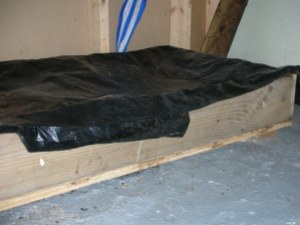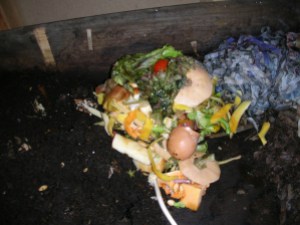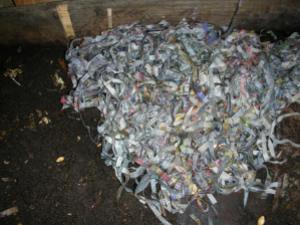at the homestead, worms eat my garbage
vermi what? or worms eat my garbage…..

since last year, we have had a home-built wooden box about 4′ x 2′ by 6″ high on the floor of our basement. we built this to experiment with vermicomposting–using worms to compost our organic waste. having read the book, worms eat my garbage by Mary Appelhof, we decided to give it a shot since our compost pile outside seemed to be too far to schlep during the cold winter months. the process is actually not that hard once you get the worms going and get over the fact that you actually have worms in your basement. in our case, no rogue worms have gotten out of the bin and the whole set up is not offensive to the olfactory senses. so, how did we set it up:
materials needed
- wooden or plastic bin (with airholes drilled in the sides and bottom)
- shredded newspaper
- dirt
- worms, of the red wiggler variety
- food compost (no meat, oils or dairy)


shred newspaper (we used a store-bought shredder) and soak in water for 5-10 minutes. wring out excess water and spread paper in your bin. mix in a couple of handfuls of dirt. add your worms (we put in about 500 worms to start). then we added food waste about once a week. the ratio of paper to food waste should be about 70 / 30. the worms eat the compost and the paper and leave behind worm castings, which are hands down the best garden fertilizer going!
other good sites to reference include:
six steps to set up worm bin
Composting Your Organic Kitchen Wastes with Worms
benefits
- keeps food waste out of landfills
- produces the best organic matter for your garden
- it’s cool to see the full life cycle of the veggie waste from our garden help next year’s crop flourish


There is no smell while you do not overload with garbage. Soil
I have been vermicomposting a little over a year and can now process about 10 pounds of waste per week. Of the few “escapees” I’ve had, none make it more than a few inches away from the bin!
Hi I am from Twinsburg and would like to start a vermicompost. Where do you get the worms? Thanks for a very informative blog.
we bought our worms from jim’s worm farm in PA, but just the other day I noticed a sign at a bait shop near cleveland that advertised compost worms, so you may want to check your local pet store or bait shop if one is near you. just make sure you get red wiggler worms (Eisenia foetida). we started with 500 worms and they have continued to reproduce to replace those that die off……good luck!
I see that you can’t put dairy in there, but are egg shells okay? My roommate had an indoor worm compost and I think he added egg shells.
You should really avoid anything that is cooked, or meat, or oil, or dairy. But egg shells are great. I think the worms use them in their gizzards. And when you use the compost the shells are a great source of calcium in the final product.
Also (don’t tell anyone … but) I’ve put cooked things (bread), oil, dairy (cheese), and even some meat (steaks) in my worm bin … and nobody died, not even the worms. It was in very small amounts, but I did it cause … well … I’m a rebel like that.
Thanks for the questions!!
Thanks for informative post.